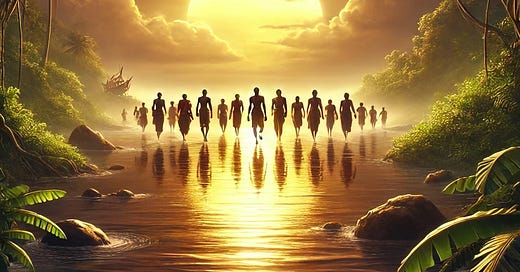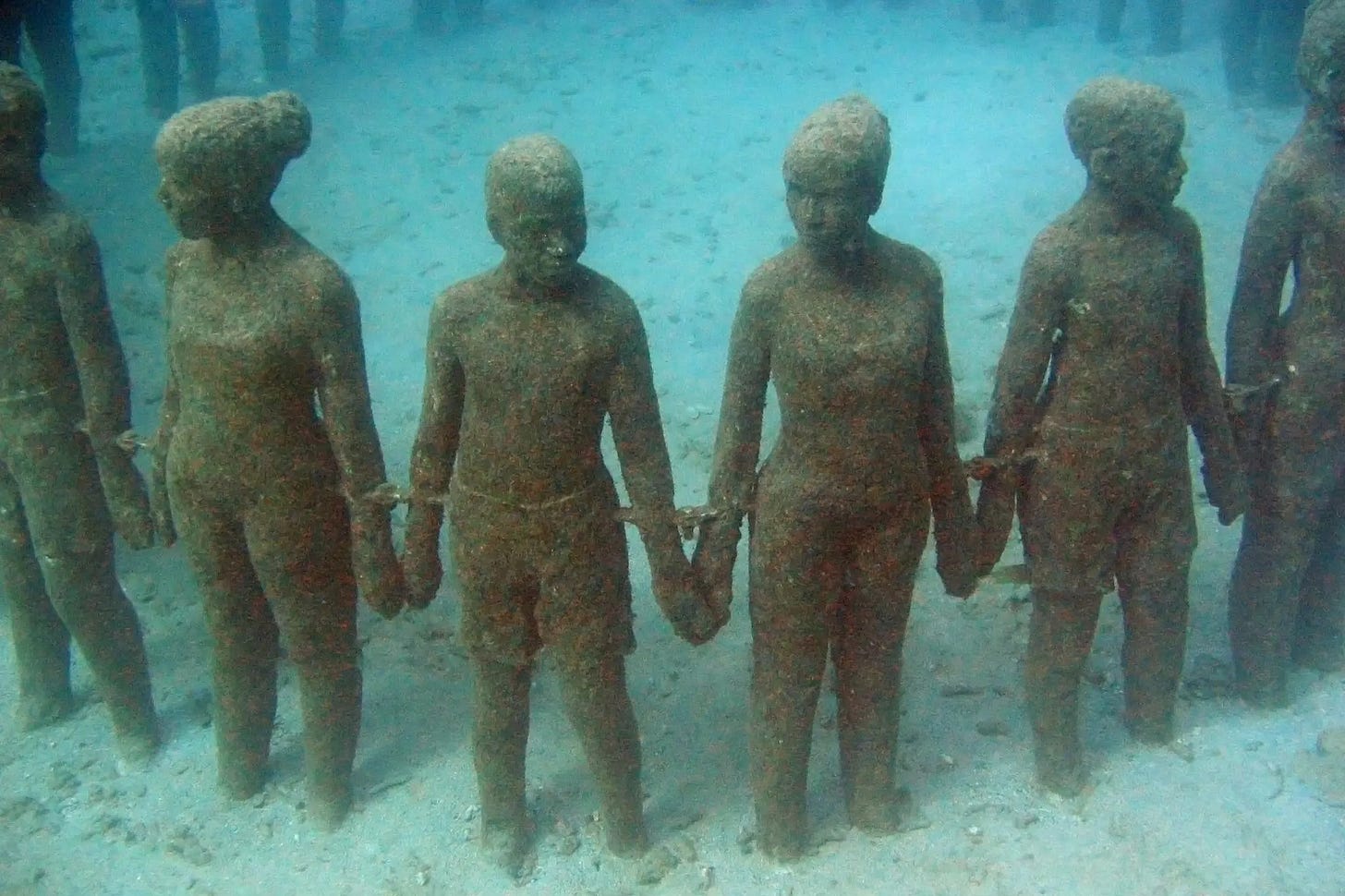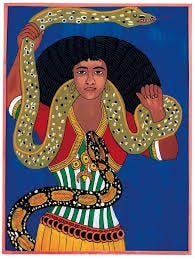Igbo Landing (1803): Ancestral Defiance, Water Legends, and the Power of Cultural Legacy
Exploring the Gullah Geechee connection, spiritual resistance, and why Black liberation lies in reclaiming our own stories and ancestral knowledge
Igbo Landing (1803): The Power of Ancestral Resistance and Cultural Legacy
I come to this story not just as an educator, but as someone deeply connected to it. My paternal grandmother, Sophia Wilson Brown, is of the Gullah Geechee people—a community whose rich culture preserves the spirit of our African ancestors. The story of Igbo Landing isn’t just a historical moment for me—it’s a legacy. A spiritual act of defiance that pulses through my lineage and continues to shape who I am today.
Many of you may remember the scene in Black Panther, when Killmonger, before his death, said, “Bury me in the ocean with my ancestors who jumped from ships, because they knew death was better than bondage.”
That line hit differently because it wasn’t just cinematic—it was truth. In 1803, a group of Igbo captives, ripped from their homeland, chose the ocean rather than enslavement, walking into the water in a collective act of resistance on the shores of St. Simons Island, Georgia.
Let’s explore why this act of defiance remains a symbol of Black liberation, spiritual resilience, and cultural preservation—and why we don’t need to borrow stories like The Little Mermaid when we have our own powerful water legends.
Why Igbo Landing Matters: Defiance in the Face of Dehumanization
The transatlantic slave trade was designed to strip African people of their humanity, but the Igbo captives at St. Simons Island refused to comply. Their act of mass resistance was not only a rejection of physical bondage but a spiritual reclamation of freedom.
Their actions have become legendary, immortalized in oral history, music, and literature. The event is often referred to as the Myth of the Flying Africans, where it is said that the Igbo, led by their spiritual beliefs, rose into the sky and flew back home. This myth isn’t just a story—it’s a manifestation of ancestral power, a reminder that liberation exists beyond the physical.
Reflection: What does it mean to reclaim your freedom, even when the world tries to deny it to you?
The Gullah Geechee Connection: Preserving Igbo Culture in America
Many of the captives who survived the Middle Passage brought with them cultural traditions that laid the foundation for the Gullah Geechee people. Through spiritual practices, storytelling, and communal living, they preserved their African identity despite attempts to erase it.
Gullah Geechee culture is rich with traditions like basket weaving, oral storytelling, and spirituals—practices that reflect Igbo heritage. As someone connected to this lineage, I see Igbo Landing as more than a historical event. It is a bridge connecting the past to the present, reminding us that our ancestors fought to pass down their knowledge, and we honor them by keeping those traditions alive.
Actionable Step: Explore and reclaim a cultural practice from your ancestry. For Gullah Geechee families, this could be learning a traditional recipe, attending a local festival, or preserving oral histories.
Spiritual Resistance and the Myth of the Flying Africans
The myth surrounding Igbo Landing is one of liberation through the spiritual realm. According to legend, the Igbo invoked their spiritual power and returned to their homeland through flight. This myth is symbolic of hope, strength, and freedom that cannot be contained by physical chains.
In modern liberation work, this myth serves as a reminder that freedom is as much a state of mind as it is a physical condition. Liberation starts with rejecting internalized oppression and reconnecting with ancestral wisdom.
Lesson for Today: Where can you free yourself mentally, emotionally, or spiritually from the remnants of oppression?
Why We Didn’t Need a Black Little Mermaid
As we celebrate the power of water in Black history, it’s important to recognize that we don’t need to superimpose ourselves into European folklore like The Little Mermaid to feel seen. That tale, written by Hans Christian Andersen, belongs to its cultural origin, and that’s okay—it’s not ours. But we have our own rich, powerful mermaid stories.
In West African and Afro-Caribbean cultures, we honor Mami Wata and other water spirits who represent mystery, beauty, and protection. Mami Wata, a divine and often feared figure, embodies both the nurturing and destructive power of water. She is our connection to the ocean’s secrets, and her mythology runs deep in communities influenced by African spirituality, including the Gullah Geechee people.
We didn’t need a Black Little Mermaid because Igbo Landing, Mami Wata, and the legacy of water in African culture have always been enough. These stories remind us that we don’t need to borrow representation when we have our own tales of resilience, beauty, and power. One story that I read to Morrigan my 5-year is Sukey and the Mermaid. For myself, I enjoy exploring the connections between African and Irish water deities as it is a profound way to honor and integrate the diverse facets of my own heritage. Both African and Celtic traditions hold rich tapestries of mythology, particularly concerning water spirits and deities
African Water Deities:
Yemoja (Yemaya): In Yoruba tradition, Yemoja is revered as the mother of all Orishas and the goddess of the Ogun River. She embodies the life-giving and nurturing aspects of water, overseeing childbirth and fertility.
Mami Wata: A transcultural pantheon of water spirits and deities, Mami Wata is venerated across various African and African diasporic communities. Often depicted as mermaid-like figures, they symbolize both the nurturing and mysterious qualities of water.
Irish Water Deities:
Boann: Goddess of the River Boyne, Boann is associated with the river's creation and is considered a source of poetic inspiration and knowledge.
Danu (Dana): A prominent figure in Celtic mythology, Danu is a river goddess and an ancestral mother figure, often linked to the land's fertility and prosperity.
Parallels and Reflections:
Both traditions emphasize the dual nature of water as a life-sustaining and transformative force. Deities like Yemoja and Boann highlight the nurturing aspects of rivers, while figures such as Mami Wata and Danu embody the mysterious and powerful qualities of water bodies.
By exploring these deities, one can find common themes of fertility, transformation, and the sacredness of water, reflecting a universal reverence for this essential element across cultures.
Engaging with these myths can serve as a meaningful way to honor and integrate the diverse heritages, celebrating the rich narratives that have shaped different cultures and honoring the loss of one’s own culture through colonization.
Reflection: What stories from your ancestry can you uplift to create authentic representation within your community?
The Role of Ancestral Knowledge in Liberation
Ancestral knowledge is a tool of liberation that colonization tried to strip away. At Igbo Landing, the captives called upon that knowledge when they made the decision to resist. It wasn’t just about escaping enslavement—it was about maintaining their dignity and legacy.
We carry that knowledge within us today, and our role is to nurture it through intentional practices like community storytelling, cultural education, and spiritual reflection. The Gullah Geechee community exemplifies this by preserving African traditions, keeping the memory of their ancestors alive through festivals, language, and rituals.
Reflection: What ancestral knowledge can you pass down to future generations to ensure their liberation is rooted in identity and pride?
Honoring Igbo Landing in Today’s Liberation Work
The legacy of Igbo Landing isn’t just a history lesson—it’s a call to action. As we engage in modern movements for justice, we must remember that liberation doesn’t always look like large-scale revolutions. Sometimes, it looks like small acts of resistance—refusing to assimilate, preserving cultural traditions, and telling the stories of those who came before us.
In today’s liberation work, we can honor Igbo Landing by continuing to challenge oppressive systems while creating spaces where our cultural and spiritual heritage thrives. Whether through mutual aid, community healing circles, or teaching the truth of our history, we carry the spirit of Igbo resistance forward.
A 28-Day Journey Through Black Resistance and Liberation
As someone deeply connected to this legacy, I created my 28-Day Journey Through Black Resistance and Liberation to guide families and individuals through stories like Igbo Landing. The curriculum includes age-appropriate lessons, discussions, and resources to help children understand Black resilience as a legacy of defiance, creation, and liberation. It is also a living document as in I will be updating the document daily with these articles and adding more stories and resources over time.
Through this journey, we center on resilience, not trauma. We teach about resistance, cultural preservation, and spiritual power. Whether you’re teaching littles or deepening your own understanding, this curriculum is designed to uplift, inspire, and empower.
Join the journey today: https://desireebstephens.bio/shop/98d6f2f8-2827-4291-b29c-1ceaf77deaac
Here are some exceptional resources for Gullah history and education:
Sunn m'Cheaux
First and only instructor of the Gullah language at Harvard University, teaching in the African Language Program.
A native speaker from Charleston, South Carolina, he is dedicated to preserving and sharing Gullah culture and language.
Active on social media, providing insights into Gullah culture and language.
Gullah Grits TV
TikTok account (@gullahgritstv) with over 294.6K followers and 6 million likes.
Features content on Gullah culture, spirituality, and community practices.
Akua Page (Geechee Goddess Akua)
Founder of @futnuss, focusing on health science education for Gullah Geechee students in their native language and cultural context.
Active on Instagram (@geecheegoddessakua), sharing insights into Gullah culture and personal reflections.
These individuals offer valuable perspectives and educational content on Gullah history and culture.
Let’s honor our ancestors by continuing to reclaim what they fought to preserve.
In solidarity and liberation,
Desireé B. Stephens CPS-P
Educator | Counselor | Community Builder
Founder, Make Shi(f)t Happen








I'm loving all your content!!!